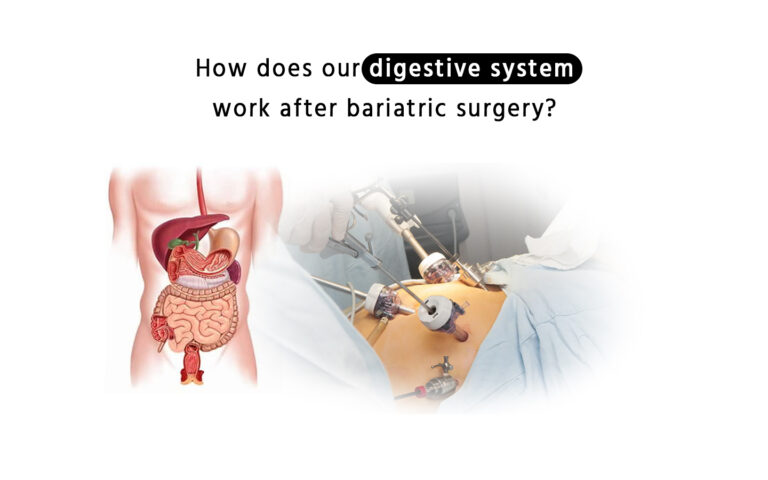Digestive system work after bariatric surgery - Aastha Bariatrics

Bariatric surgery, also known as weight loss surgery, is a surgical procedure that alters the digestive system and helps promote weight loss.
There are several types of Bariatric surgery that work either by reducing the size of the stomach or by rerouting the intestines.
Weight loss surgery may involve the following methods:
Restrictive: This type of procedure makes the stomach smaller, and helps slow down digestion. By reducing the amount of food the stomach can hold, this method helps lessen a person’s food intake.
Malabsorption: This type of procedure shortens or alters the structure of the digestive tract. This causes food to bypass portions of the tract which limits the nutrients and calories absorbed by the body.
Mixed (restrictive and malabsorptive): This procedure causes malabsorption and also limits the food intake.
After the weight loss surgery the digestive system is modified in several ways, which affects how the food is digested and absorbed.
Bariatric surgery may cause the following changes in the digestive system:
Reduced calorie intake – The primary benefits of weight loss surgery is that it can reduce the amount of food a person can eat at a time. As a result, patients feel full more quickly and are unable to eat as much food as they used to before. This leads to reduced calorie intake which is necessary for weight loss.
Increased satiety – Weight loss surgery can lead to decreased hunger increased feelings of fullness after eating, making it easier to stick to a reduced-calorie diet. leading to decreased hunger and increased feelings of fullness
Changes in gut hormones – Bariatric surgery can also impact the way digestive enzymes are produced and released in the body. It can also lead to changes in the gut hormones that regulate appetite and satiety.
After the surgery, the hunger hormone called ghrelin is reduced. Ghrelin is a hormone that stimulates appetite, reducing its production helps to curb hunger and food cravings.
Alterations in the gut microbiome – The gut microbiome plays an important role in regulating appetite and energy metabolism. Bariatric surgery also alters the composition of the gut microbiota leading to changes in metabolism and appetite regulation that may contribute to increased satiety.
Improved digestion – Weight loss surgery results in improved digestion and fewer digestion problems, such as acid reflux and heartburn. This may be because the surgery reduces the size of the stomach and alters the way the food is digested.
Improved blood sugar control – Weight loss surgery helps to improve the blood sugar control, in people with type 2 diabetes. This is because the surgery can alter the hormones that regulate the blood sugar levels, making it easier for the body to process glucose.
Reduced risk of obesity related health problems – Bariatric surgery helps to reduce the risk of obesity related health problems such as type 2 diabetes, high blood pressure and heart disease.
This is because the surgery helps patients to lose a significant amount of weight, which can improve the overall health and reduce the risk of these chronic conditions.
After bariatric surgery, the digestive system undergoes a number of changes that can have a positive impact on the overall health and well being.
It is important to note that bariatric surgery should be considered after talking to
Why We Are?
- Asia's Trusted Bariatric Center
- Centre of Excellence
- Patient Trusted Highly Volume Bariatric Center in Mumbai
- EMI, Cashless & Mediclaim Facilities are Available
- Daily Patients Follow-up after Bariatric Surgery
- Patient Support Group Every Month
- Obesity Awareness Program
- Available with Latest Technologies
- 18+ Experience in Weight Loss Bariatric Surgery
- 300+ Weight Loss Diet Plan & Recipes
- Highly Trained & Experienced Bariatric Nutritionist
- Patient WhatsApp Chat Group
- & Many More
Medically reviewed by Dr. Manish Motwani, Bariatric & Metabolic Laparoscopic Bariatric Surgeon — Curated by Vidhi Jain






